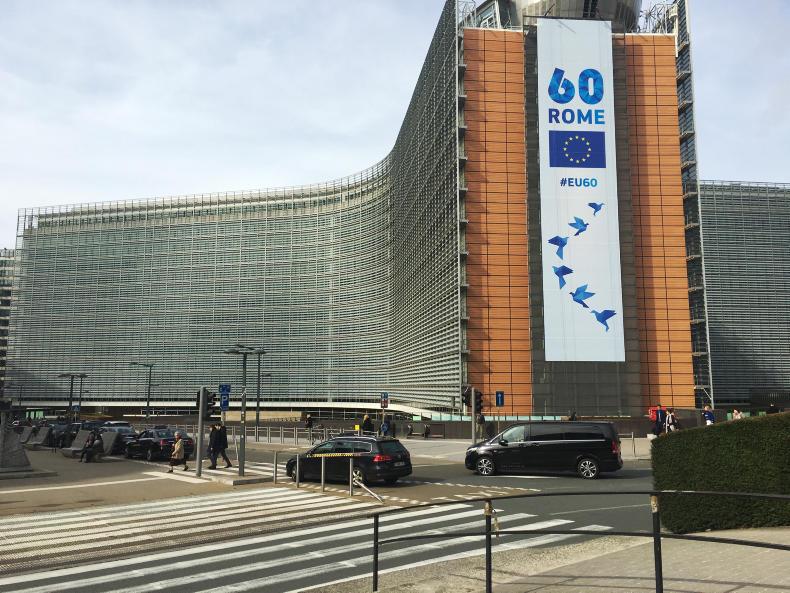The Agricultural Markets Task Force (AMTF) presented its report on unfair competition in the supply chain to EU Commissioner for Agriculture Phil Hogan on Monday. He in turn presented it to the Council of Ministers meeting in Brussels on Tuesday.
The task force, made up of 12 EU experts, recommended far-reaching legislation by the EU to address the issue of practices and transparency beyond the farm gate. The group includes Northern Ireland’s David Dobbin, recently retired chief executive of Dale Farm.
The far-reaching report, well leaked in advance, recommends something of an about-turn on the whole area of unfair trading practices (UTPs) in the supply chain after the farm gate, the meat, dairy, fruit and vegetable sectors being mentioned in particular. Legislation similar to the Grocery Code Adjudicator in the UK is recommended on an EU-wide basis.
It has recommended banning practices such as payment delays of over 30 days, unilateral and backdated changes to contracts as well as last-minute order cancellations for perishable goods. Suitable penalties and EU legislation to provide guidance on how these penalties should be calculated is to be developed.
The Grocery Code Adjudicator in the UK, also established by legislation, is the model in mind here. However, it is suggested that the AMTF will go further and recommend that complaints aren’t confined to processor suppliers to supermarkets, but will also be able to be made by producer groups or co-ops.
An area of particular interest to farmers that has been tackled robustly in the report is around market transparency. There is a recommendation for mandatory price-reporting at the processing stage. This could be a variation of the US “cut-out” model on beef which represents the value of a carcase based on the value of individual cuts, but detail will have to be worked out. The USDA model is also a key influence in the report. Mandatory price reporting already applies across the EU on prices paid for cattle.
The report also encourages the development of futures markets, again something that is well established in the US. It also wants a derogation (from competition law) to allow farmer organisations or associations to jointly plan sales and production to enhance farmer negotiating power.
If this expected report is accepted, it will represent a policy change at EU level on unfair competition policy. Up until now, there has been a preference for voluntary arrangements or legislation at a national level, as in the UK. However, the campaign for legislation has developed over the course of this year with Parliament in June voting by a massive majority to legislate. Commissioner Hogan now has the task of getting it through the Commission as this is an issue that crosses several departments, and the Council of Ministers where opinion is thought to be split.
Priority
It will now return to the final Council of Ministers under the Slovak Presidency, for whom this was a priority area, in mid-December.
The report was welcomed by the EU farm organisations representative body, Copa-Cogeca, saying that an EU framework was vital to curb UTPs. The IFA office in Brussels told the Irish Farmers Journal that the report’s recommendation of framework EU legislation to address UTPs among retailers, as IFA has called for, must now be adopted and realised.
However, Euro Commerce, which represents retailers and wholesalers, was dismissive, saying that the current crisis was the short-term result of supply and demand and no legislation can make that go away.
If the recommendations of this expected report are implemented it will be a game changer in how business is conducted on agricultural produce once it leaves the farm gate. At this point, there is an excellent price-reporting system on a standardised EU basis.
However once it goes into large, often private processing companies, and then into ever larger retailers, there is no public knowledge on what is being earned where, other than a regular sweeping statement on agri-food being a low-margin business.
However, these recommendations will make minimal contribution to the biggest problem facing farmers in many commodities – namely prices and farm incomes. The information and knowledge will be welcome and indeed a useful business tool but in itself, won’t drive price. In the beef sector, for example, the US has one of the best systems in the world, with USDA publishing daily prices of beef cuts and stocks being held, yet their farmgate price is currently 30c/kg below the EU average.? However, greater knowledge will lead to greater understanding, confidence in the supply chain and collaboration, which in itself will be a sufficient step forward to make it worthwhile.
Read more
Processors should publish their prices and margins – EU report
Editorial: unfair trading practices now on EU agenda
The Agricultural Markets Task Force (AMTF) presented its report on unfair competition in the supply chain to EU Commissioner for Agriculture Phil Hogan on Monday. He in turn presented it to the Council of Ministers meeting in Brussels on Tuesday.
The task force, made up of 12 EU experts, recommended far-reaching legislation by the EU to address the issue of practices and transparency beyond the farm gate. The group includes Northern Ireland’s David Dobbin, recently retired chief executive of Dale Farm.
The far-reaching report, well leaked in advance, recommends something of an about-turn on the whole area of unfair trading practices (UTPs) in the supply chain after the farm gate, the meat, dairy, fruit and vegetable sectors being mentioned in particular. Legislation similar to the Grocery Code Adjudicator in the UK is recommended on an EU-wide basis.
It has recommended banning practices such as payment delays of over 30 days, unilateral and backdated changes to contracts as well as last-minute order cancellations for perishable goods. Suitable penalties and EU legislation to provide guidance on how these penalties should be calculated is to be developed.
The Grocery Code Adjudicator in the UK, also established by legislation, is the model in mind here. However, it is suggested that the AMTF will go further and recommend that complaints aren’t confined to processor suppliers to supermarkets, but will also be able to be made by producer groups or co-ops.
An area of particular interest to farmers that has been tackled robustly in the report is around market transparency. There is a recommendation for mandatory price-reporting at the processing stage. This could be a variation of the US “cut-out” model on beef which represents the value of a carcase based on the value of individual cuts, but detail will have to be worked out. The USDA model is also a key influence in the report. Mandatory price reporting already applies across the EU on prices paid for cattle.
The report also encourages the development of futures markets, again something that is well established in the US. It also wants a derogation (from competition law) to allow farmer organisations or associations to jointly plan sales and production to enhance farmer negotiating power.
If this expected report is accepted, it will represent a policy change at EU level on unfair competition policy. Up until now, there has been a preference for voluntary arrangements or legislation at a national level, as in the UK. However, the campaign for legislation has developed over the course of this year with Parliament in June voting by a massive majority to legislate. Commissioner Hogan now has the task of getting it through the Commission as this is an issue that crosses several departments, and the Council of Ministers where opinion is thought to be split.
Priority
It will now return to the final Council of Ministers under the Slovak Presidency, for whom this was a priority area, in mid-December.
The report was welcomed by the EU farm organisations representative body, Copa-Cogeca, saying that an EU framework was vital to curb UTPs. The IFA office in Brussels told the Irish Farmers Journal that the report’s recommendation of framework EU legislation to address UTPs among retailers, as IFA has called for, must now be adopted and realised.
However, Euro Commerce, which represents retailers and wholesalers, was dismissive, saying that the current crisis was the short-term result of supply and demand and no legislation can make that go away.
If the recommendations of this expected report are implemented it will be a game changer in how business is conducted on agricultural produce once it leaves the farm gate. At this point, there is an excellent price-reporting system on a standardised EU basis.
However once it goes into large, often private processing companies, and then into ever larger retailers, there is no public knowledge on what is being earned where, other than a regular sweeping statement on agri-food being a low-margin business.
However, these recommendations will make minimal contribution to the biggest problem facing farmers in many commodities – namely prices and farm incomes. The information and knowledge will be welcome and indeed a useful business tool but in itself, won’t drive price. In the beef sector, for example, the US has one of the best systems in the world, with USDA publishing daily prices of beef cuts and stocks being held, yet their farmgate price is currently 30c/kg below the EU average.? However, greater knowledge will lead to greater understanding, confidence in the supply chain and collaboration, which in itself will be a sufficient step forward to make it worthwhile.
Read more
Processors should publish their prices and margins – EU report
Editorial: unfair trading practices now on EU agenda









SHARING OPTIONS